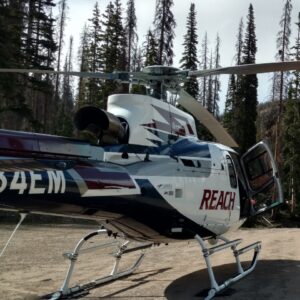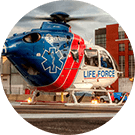(DALLAS) – Global Medical Response (GMR) is sending 50 ambulances and 116 personnel from three of its own companies – American Medical Response (AMR), Rural Metro Fire and Air Evac Lifeteam – and other EMS providers to southern Texas in response to a FEMA request to help the federal government and local emergency personnel respond to the COVID-19 pandemic. This is the company’s fourth major deployment since COVID-19 gripped the United States.
GMR deployed Paramedics, EMTs and support personnel on Friday, July 24 to Pharr, Texas, in Hidalgo County. Caregivers and support personnel are responding from 25 states.
“Southern Texas communities have been hit very hard by the COVID-19 pandemic,” said GMR Chief Operating Officer Ted Van Horne. “We are supporting FEMA with this response to provide first responder crews and ambulances from all across America to assist hospitals and our fellow emergency services providers.” Van Horne added that GMR also sent logistics teams to provide additional support for the deployed first responders.
GMR’s Office of Emergency Management activated the company’s National Command Center (NATCOM) in Dallas on Jan. 28 to monitor the spread of the virus closely and work with state and federal agencies to deploy teams for screenings, transports and evacuations. GMR’s medical leaders are working closely with the Centers for Disease Control and departments of public health around the country. In March and April, GMR deployed more than 1,600 EMS crews and ambulances to New York City and New Jersey.
GMR closely monitors all crews, including those from AMR and EMS network providers who are part of the deployment as well as GMR teams who remain in their home communities. Monitoring includes the following:
- Evaluation of each crew member, which includes symptom and temperature checks every 12 hours
- GMR’s online infectious disease screening platform (GMR’s MAST – Medical Assessment and Screening Tool)
- 24/7-staffed Nurse Navigation and Physician team to assess, screen and monitor employees who have been in contact with COVID-19 positive or presumptive patients
- Phone calls and check-ins to GMR crews or personnel who have been quarantined or are self-isolating
GMR also deployed a mental wellness leader with the crews to assess, monitor and provide guidance on site.
Van Horne added that the deployments do not impact GMR’s or the other EMS providers’ ability to meet the needs of patients in home communities. GMR air and ground teams continue to provide emergency and non-emergency transports to tens of thousands of patients nationwide.
Deployed crews work under the guidance of FEMA, state and local governments when they arrive at their assigned areas.
AMR is the primary medical ground transportation division of parent company Global Medical Response. As the nation’s largest provider of ground medical transportation and FEMA’s prime emergency medical service response provider, AMR has a national agreement with FEMA to provide ground ambulance, air ambulance, paratransit services and non-ambulance EMS personnel to supplement the Federal and Military response to a disaster, an act of terrorism or any other public health emergency. Van Horne said teams prepare for emergency responses around the country with year-round training exercises, storing equipment and vehicles in strategic locations. This preparation enables the company to respond usually within 36-48 hours’ notice.

Pre-travel Safety Tips – Know before you go
When getting ready to travel it’s always a good idea to make safety a priority. Whether you’re traveling abroad or on a weekend trip, planning

Air Ambulances are Helping Bridge the Gap in Healthcare for Rural Hospitals
One of the biggest issues in rural healthcare is the lack of healthcare facilities. Many rural areas don’t have enough doctors or hospitals, and appropriate

Tips for Flying while Pregnant
Most pregnancies are uneventful, and women can continue with their daily lives with few restrictions. Flying, however, might not be an activity that is right




